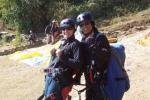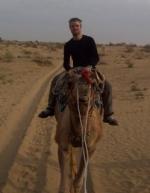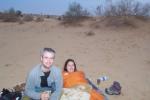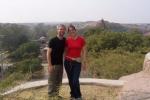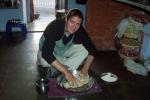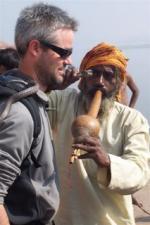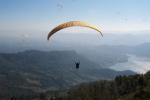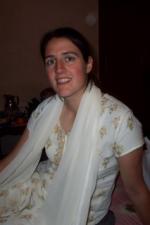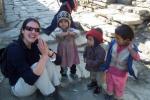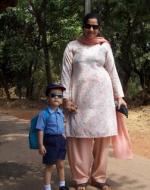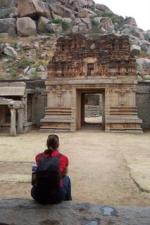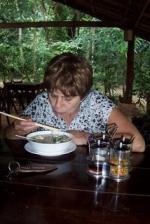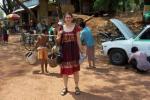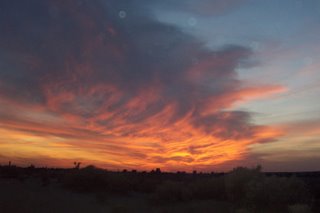
Sunset over the Great Thar Desert.
Immediately following our hyper-dramatic Hindi film experience at the Pink City's Raj Mandir meringue inspired cinema, we caught a night train to Rajhastan's desert outpost town of Bikaner travelling, as always, in India's second lowest train class. Our usual strategy is to reserve, using India's miraculously functioning on-line ticketing service, the two top bunks allowing us to go to bed whenever we want to without disturbing the passengers below us. Unfortunately, the little-used Jaipur-Bikaner line runs an older and smaller model of train with low ceilings that force us to squeeze our bodies through a tiny crack separating the bed from the grungy ventilation fans, leaving us only just barely enough room to lie flat on our backs, occasionally being woken by the sensation of our noses rubbing against the dirty roof-top. Despite expensive ear-plugs, sleeping medication, and junk-country earphones, we are forced to endure yet another restless night when our carriage is invaded, at some ungodly hour of the morning, by a gang of yapping old Indian women.
As later explained to us by a friend of ours from Bangalore: Indians believe that it is their birth-right to make noise. It is not that they are trying to be rude; the entire concept of shutting off the light being quiet for others trying to sleep is, to them, such an abstract metaphysical paradigm as to be simply unfathomable to the sub-continent's general populace. It is not just the gangs of old Indian crones which seem to haunt the wakeful halls of every late-night sleeper train in the country, even the men running the hotels spend hours chattering in Hindi to each other into the wee hours of the morning. And what on earth are they talking about, anyway ? Where I come from, adult men just don't have that much to say to each other and certainly don't stay up all night giggling like school girls.
At times, Katlijn will be driven mad by the hotel men whose incessant gossiping simply overwhelms her specially molded high-end India-traveller's ear protection. Finally, in a fit of insanity, she will throw her ear plugs angrily at the door and storm out into the neighbouring hotel lobby to find six loitering men locked in loquacious banter, and frantically yells out to them:
"Oi ! We're trying to sleep in here !"
The hotel men stare at each other, exchanging blank looks- their brains, having been conditioned to a lifetime of whining scooters, quarrelling urban farm animals, and obnoxious horn blasts, are now no longer capable of even grasping the basic notion of noise pollution. Instead, after a brief pause, their Hindi chattering starts up again more intently as they desperately try to sort out, by group consensus, what the problem could possibly be, until finally they seem to settle on a theory, a plausible hypotheses: their best guess at what her frantic late-night fussing might be referring to. The oldest turns down the volume of the blaring Indian pop music, and asks, in his best English,
"Hot water bucket ?"
As I mentioned already, we don't get a lot of sleep in India. We finally arrived at Bikaner the next morning and groggily squeezed our way out of our claustrophobic train coffin, hauled our gigantic dusty backpacks from out beneath two loudly snoring old crones, and made our way to Vino's fabulous Bikaner Camel Safari Guest House: a sandy desert budget accommodation that seems to be managed and operated entirely by children.
After a brief visit to Bikaner's old city, we made arrangements with Vino for a five day camel safari through the Thar Desert. We were ready to go by the next morning and met up with Steve, a chatty Swiss backpacker who will keep us company the first couple of days. Steve is an economist taking several months off for long-term travel and proving, yet again, that the world's backpackers are quite an agreeable and varied people.
We started our desert trek at Kani Mata Temple, a peculiar and remote 14th century holy outpost in the middle of the sand dunes whose explicit purpose and ardent cult of followers is devoted solely to the worship of rodents. It seems that the cadre of Hindu holy animals knows no bounds: cows, monkeys, elephants, bulls, tigers and more. But, seriously, rats !? Just when we thought India's penchant for superstition could not possibly be stretched any further, we find ourselves in a temple, whose floors look alive with the scurrying of countless holy rodents, where it is considered auspicious for one to scamper over your bare feet and especially good fortune if you can spot a big, fat, fluffy, white one. We made our way carefully around the premises, together with a few barefooted devotees- their eyes peeled for white rats hoping that they might be so blessed as to feel the tickling of rat whiskers between their toes- all the while wondering if this temple was really built here for the explicit purpose of worshipping rats, or whether they simply got deified as the pragmatic solution to an ancient and uncontainable infestation.
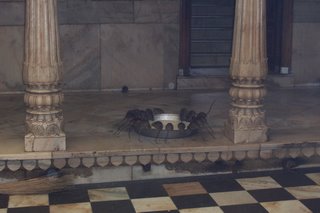
According to devotees of the affectionately titled "rat temple", the holy rats seen here (called kabas) are the reincarnation of dead storytellers brought here to deprive Yama, the Hindu god of Death, of human souls.
After visiting the rat temple, we met up with our desert guides, the camelman and the cook. Despite spending every second together for five long hot days, we had a tough time making any kind of connection with them given their tenable grasp of our language and our entire ignorance of whatever Rajasthani tongue they communicated with. In fact, we never even learned their names, having given up after making a hash with the pronunciation and finally settling on calling the camelman the "white guy" and then referring to the cook at all times relative to the camelman as simply "the other guy".
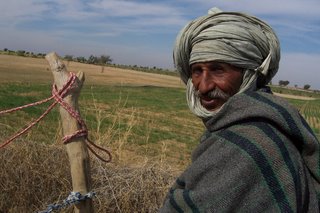
Our camelman, the white guy, so-named for his white turban and white loin cloth which he wore and washed daily.
We had three camels with us: Steve's camel, our riding camel we named "Alice", and a strapping young male camel we named "Orneel de Kameel",who carried the cart while periodically sticking its tongue out at passing lady camels who, without fail, would saunter giddily towards Orneel's manly camel stench, unable to contain their passion at such witty flirtation. All over the Great Thar Desert, camelmen would have to chase after young virgin camels who had fallen under the powerful spell of Orneel's wooful raspberries.
From the very beginning, it was obvious that sitting on a camel for five days was going to be a supremely uncomfortable experience. The camelman had Alice lie on the ground so I could get on the saddle. Before I even had a chance to sit down, Alice, upon feeling my legs brush against his side, would suddenly let out a gaping camel groan of disapproval and lurch upwards, slamming its hard backside into my unsuspecting crotch while stretching my stiff legs sideways dangerously beyond the safety zone of my admittedly limited flexibility. This would be followed by several hours of stoically enduring the graceless back-and-forth saunter of Alice slowly rocking my testes into numbness until, mercifully, it was time for me to get off and begin the long and painful process of returning circulation to the lower half of my body. Camels also do not make a smooth transition from the standing to sitting position. Instead, they sort of fold themselves up in several fast jerking motions like a collapsible lawn chair, each fold giving the rider the sensation of freefall and each time landing, inevitably, hard on his crotch. By the time we finally got off, our legs had been reduced to a senseless oblivion: two heavy weights swinging lifeless from our torsos waddling awkwardly about the desert.
The first few days we enjoyed taking turns riding the camel and lying down in the back of the cart peacefully reading a book. However, it wasn't long before we began fighting over who got to lie down in the cart and who had to receive a three hour crotch pummeling. Finally, perhaps out of compassion, the camel man let us both lie down in the camel cart while Alice, bareback and unburdened, trotted happily behind us with a smug look of victory.
During our trek, we enjoyed the quiet peacefulness of the scrubby deserts understated beauty punctuated by the occasional viper, vulture, and gazelle. We often passed secluded families living in tiny isolated mud huts, or even small mud villages sprouting sleepy rural desert communities.
.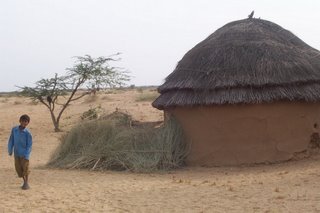
Rajasthani boy and his mud home.
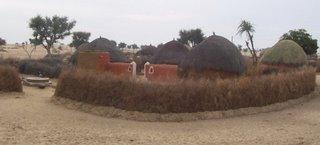
Thar Desert village.
The people of the Thar desert were exceptionally curious of us, especially the young children. While we stopped for tea or meals, small groups of brothers and sisters would huddle together and plant themselves at a safe distance to apprehensively study us in great detail like tiny fledgling scientists. Astonishingly, these profoundly patient children could go about their staring business uninterrupted for many hours in such a deep and pure state of meditation that, I must presume, it did not even occur to them to ask me for a pen. In the few cases they did ask us for something, it was never money, toys, or pens, but empty plastic water bottles of all things. In fact, empty plastic bottles were a trophy so deeply coveted by desert children, it drove them to acts of camel cart thievery that forced our poor nameless cook to be constantly vigilant and, when necessary, jump off and chase after them.
The larger Thar Desert villages each have a long trough of water for the camels. As we waited for Alice and Orneel to drink their share, the entire population of the village, often numbering in the hundreds, would emerge from their mud houses and rush down the street cheering our arrival at what felt like a royal welcome. When our camels were finished and we would continue on our way, the children would run after us into the desert for a while yelling "ta-ta !" and erupting into tearful laughter every time we responded to them.
The cook picked up pieces of valuable dried wood along the way which he would use, together with camel droppings, to make a fire. From time to time, he would also jump off the cart and disappear into a seemingly random mud hut in the middle of nowhere with an empty bottle and some supplies, then appear again sometime later behind us, running along the sandy trail in his sandals to catch up, the bottles now full of the desert goat milk he uses for our obligatory morning, afternoon, and evening chai. At some of the larger villages, he could be seen with the locals trading for supplies and, especially, flour for making his delicious chapattis. Furthermore, many of the locals supplied us with water from their personal wells. In return, our operation ran a kind of desert taxi service between the tiny villages as the camelman would allow complete strangers to ride on the cart with us along the empty roads. In many cases, our friends would join us for a hot cup of chai and even sit around the campfires at night, together with their sons and daughters, always staring at us, always smiling, while our cook and the camelman eyed our empty plastic containers nervously.
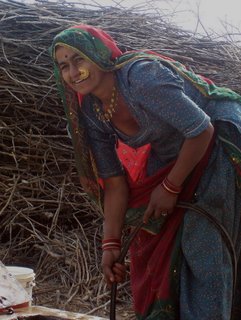 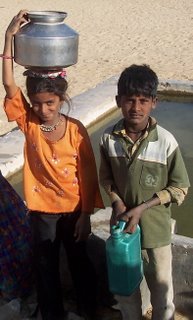
Desert characters.
Despite working in the remote seclusion of the desert, the cook produced some extraordinarily delightful Indian vegetable curries making each mealtime an experience Katlijn and I, saddle-sore, would very much look forward to. While one cannot deny his obvious culinary talents, he did not run the most sanitary of kitchens and the small number of pots and pans he carried with us often served multiple purposes including wash board and portable camel latrine. At one point, we watched in horror as he used his dirty shirt sleeve to rub a large pile of green droppings off the pan and into the fire, mix and pound the dough on the same pan, then roast his superbly shaped chapattis directly on the smouldering camel dung. Furthermore, due to the difficulties inherent in finding water in the desert, after every meal, we washed our dishes in dirt we scooped from the ground. To be fair, a sand-wash is an amazingly effective desert camping trick which I suggest you all try at home if you don't believe me, the only drawback being chewing on the little bits of sand that perennially find their way into every bite.
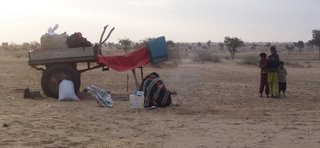
The cook concocting another one of his delicious stews while desert children nervously study our camp.
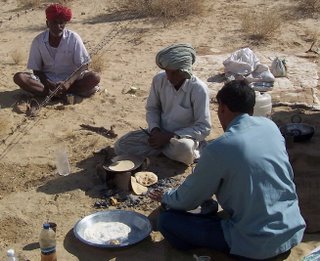
The cook pounds and shapes the dough as the camelman cooks the result on a tawa then puffs up the final chapatti directly on the coals. An old local man in a red turban enjoys a hot metal cup of chai while quietly watching them at work.
Evening in the desert is a particularly magical time as the dark blue sky transforms itself into the deep crimsons, violets, and yellows of some of the world's most spectacular sunsets. At night, we sleep in the open sand gazing at the brightly lit stars above us, while each morning the cook wakes us up with breakfast in bed. Sipping on hot chai while crunching down on our sandy toast, the Thar Desert entertains us again with another inspired sunrise, worlds away from the late night gossip of India's hotelmen.
Despite hot weather during the day, the desert temperature drops rapidly at night. Underneath two layers of blankets and our sleeping bags, while isolating ourselves from the ground with two more layers of blankets, we slept comfortably beneath the stars.
|



